So PBS Idea Channel did a bit about Animal Crossing tying it
into Hiroki Azuma's theory of otaku as narrativelessness. I was
shocked and not sure how to respond to someone who says Animal
Crossing has an "absence of narrative". Or makes the base critical
mistake that "the point" of a work is merely one thing that happens in
the work. So I snarked and then this happened, and I really
don't know how to respond to someone who thinks writing YouTube
comments - and therefore reading YouTube comments - is a good use of
anyone's time.
But I still feel I owe a response of more than 140 characters, because
I think this is a serious issue on a couple axes. It goes beyond just
Animal Crossing and into more fundamental issues of what games do
and how we talk about them.
Animal Crossing has a narrative. It even has a canonical "story,"
just not a three-act plot. Everything else in the video falls apart
at that one fact. But even ignoring that the analysis is shallow.
Collecting is a thing you can do in Animal Crossing, yes. But while
"collecting" is semantically broadened to near-meaninglessness in the
video, that still ignores dancing with friends and designing clothes
and planning roads and writing letters and rocking out and
appreciating artwork and appreciating fake artwork and glitching your
way into the river and watching TV and sitting on a stump and just
enjoying the 2AM music. And still I wouldn't call any of these things
"the point" of the game. (I'm not ready to stake out any claim on that
yet.)
Why I am trying to "collect" a villager's picture before they move
out? Why am I filling my back room with musical instruments for
jamming when friends come over? It's because of the memories of the
time I spent in the game and a desire to make more - the narrative -
not in spite of it.
I don't want to tell you how Animal Crossing should be played! I
just don't want you telling people how it should be played. I will
tell you what I get out of playing it, and I want you to tell me what
you get out of playing it. This is the difference between the basis of
pseudo-science and critical discourse. A personal account is missing
from Rugnetta's video and offering an analysis of the play experience
sans reference to real player is one of the few wrong ways to do
it.
So the best long-form response I can muster is to continue to document
my own experience with the game, and read a diversity of others'
experiences. Unlike Rugnetta I'm not universalizing or essentializing
mine - it is mine, real but one of many. (I am also not getting paid
via YouTube hits.)
Partway through composing this,
Gamasutra posted this series of letters between its authors which
saves me the effort of writing the second half. There's no better way
to highlight the variety of experience - and the shallowness of the
one offered by Rugnetta - than an actual discussion around it. Here's
what approaching the game with "otaku citizenship" gets you, from Mike
Rose:
I was hooked on collecting things and being part of something, and
now that that feeling has died off, I can't really see why I was
playing it in the first place.
And here's what other approaches get you, from Kris Ligman:
As we become more urbanized and these natural and small-town spaces
disappear, we escape to a sort of virtual outdoors out of
comfort. In fact, I love how Animal Crossing also serves as a
critique of the encroach of modernity...
Or Christian Nutt:
In the end what I am left with is this: how long can this go on? I
don't see an obvious end to it. I'm sure it'll taper down and down,
but for right now, I've forged a real emotional connection to my
game, and I can still see uncharted territory, too.
There's nothing wrong with jumping at collection or stopping a game
after two weeks (though like Mike, you might realize in retrospect it
was a poor choice). There is something wrong with saying that since
you stopped after two weeks, that's all there is to the game. Try
actually engaging with it; if you can't do that, don't tell other
people what they're doing.
PBS Idea Channel is often social media garbage, more thinkfluencing
than thinking. So why bother responding? Because it's also
getting more attention than, like, any of the other critical writing
about Animal Crossing I've linked to. When Warren Spector (or
other big-mouthed-dev-of-the-week) says there's no quality mainstream
games criticism, this is why. Lazy nerd pop culture callbacks get tens
of thousands of views and big branding - more than twice as many as
Leigh Alexander's Kotaku post of about the same age, and
everything else is on sites much smaller than Kotaku. Thoughtful
analysis is buried.
I played Liz Ryerson's Problem Attic (play online,
direct download, soundtrack, other good music). It's an
exploratory platformer and will take most players at least a
couple hours to finish. It demands relatively high skill to
play. (More than most modern platformers, less than Super Mario
Bros.)
It made my laptop draw a lot of power and run very hot. This is
probably some issue with Stencyl.
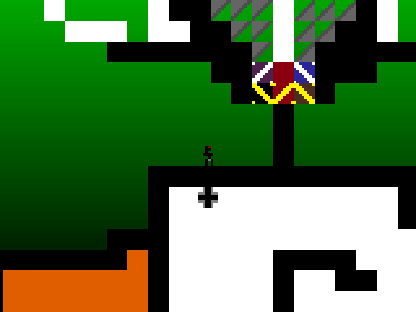
I feel like the game works to defy writing / talking about its
contents. Very little is representational. It doesn't offer any text
in-game to describe its elements (beyond, for a couple rooms, a pair of
letters). Its contents generate descriptors like "the
horizontally-controllable crosses" or "the striped alternative
foreground" which are meaningless unless you play it, and then you
don't need them anyway. It is comfortable being a videogame and
uncomfortable being a rules sheet or essay.
Accordingly it asks, but also rewards, a high degree of videogame
literacy as you parse out the contents yourself.
There were a few levels that reminded me of other games. One scene in
particular dredged up a strong memory of Braid. Several moments were
reminiscent of VVVVVV. The game is radically unlike either of these,
though.
I think this is an indescribably important game.
Liz Ryerson says the game is "about prisons," which I see, but there
was a more personal touchstone for me. I have recurring
nightmares of forms and queues and a general fear - not just "dislike"
but something more visceral - of bureaucracy. Think of the anxiety you
get when walking near the edge of a tall cliff; that's a reasonable
comparison to how I feel engaging relatively mundane bureaucratic arms
like a post office or bank teller.
In Problem Attic I felt less jailed than lost, in the same way I do
in those dreams. The environments hinted at an underlying structure /
design / purpose which layers of accreted details and incidentals
obscured or broke. Navigating something that at first blush looks like
unstructured garbage (or worse, parsing out a structure that turned out
incorrect), vomitus of numbers and symbols that withdraw while
simultaneously demanding engagement. It was the same feeling I got
trying to prepare my taxes or my health insurance forms - a fear of
being lost in a system just outside my mental grasp.
As a trivial, early, and easily explicable example: Riding the
"enemies" that chase you and shake the screen and play discordant
noise is key to solving many of the rooms. The only way to succeed is
to engage the system despite your ignorance and its apparent
hostility.
I made the Labelle Litanizer, a program which generates random
Animal Crossing: New Leaf outfits.
Latour litanies confront us with objects in a way that defies our
usual methods of grouping or reduction. In a similar way the Labelle
Litanizer asks us to consider the possible rather than merely the
desirable or expected.
I was surprised at the tonal bluntness sometimes - a hint of disgust
in Have you considered a bathrobe?
, a winking flirt in Have
you considered a pink wet suit, gas mask, and timer?
The in-game text often captures this effect too, the "mere"
substitution of objects changing the sentence's meaning in ways beyond
simple reference. (Take that, positivism!)
Along with the variety it does suggest it's worth noting what the
constraints prevent. In Animal Crossing you are forbidden from
holding a balloon and an ice cream; a false nose and glasses; two
different shoes. Tools (shovels, axes) and toys (balloons, tweeters)
are indistinguishable. Eventually every player asks whether Animal
Crossing is real play or fake work; this ontography only contributes
to blurring that line.
The point of such things is that they mostly speak for themselves, so
that's all I'm going to say for now.
I'm playing a ton of Animal Crossing: New Leaf. I don't have a lot
to say holistically about it. I'll leave that to
Christian Nutt at Gamasutra, and some further insight about what
it means for Nintendo vs. what it means for humans from
Anna Anthropy's essay at Tiny Cartridge. It's a good game, and a
nice game, and cuts broad and deep and expressive, and if you can
afford a Nintendo 3DS and the game and you think you might like it,
you probably will and should get it.
Like many players I've been rushing to upgrade my house. My main room
is at maximum size, as is my second floor, and my left and back rooms
have been upgraded. This house is bigger than any I will ever actually
own. The rooms all have themes - the left is doubling-down on balloons
for HHA points; the back is a music studio full of instruments; the
basement is a display for my mask collection.
But actually, the room I've spent the most time organizing is my
right-side room, and it's still 4x4.
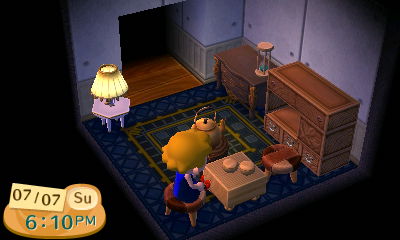
For a game with a reputation for being laid-back and rustic Animal
Crossing play is often rushed and concerned with growing, expanding,
filling, saturating. This room is a slight push-back against
that. It's as small as it can be and the pieces in it, though
carefully curated, are also haphazard. The desk is "rococo" but the
room lacks ostentation; the lamp "regal" but most of the furnishings
are cheap; the stools "modern" but there's no sign of the machined
lines and precision bevels we associate with a modern aesthetic.
Despite this mixture the room remains cohesive, cozy, and my main
design goal, fictionally functional.
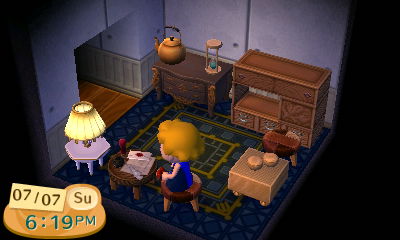
Many rooms in New Leaf are designed as set-pieces.
Christian's 7-Eleven is a good example here. I don't want to
denigrate this kind of design in any way - I'm working on rooms like
this myself! - but there's also something about it that rubs me the
wrong way. Do you really want an orchestra in your house, or a
dinosaur, or a 7-Eleven? What's the role-play going on here - you're
playing a fictional character opening a 7-Eleven? You're playing a
fictional character playing at running a fake, toy 7-Eleven? The
character is "you" playing at running a fake 7-Eleven? All the answers
I have bring forward awkward inconsistencies; does the consistency
matter at all? Even the rooms that are not "play rooms" look
more like an IKEA catalog than a lived-in space.
I don't have an answer. I still enjoy doing it at the same time I
wonder what, if anything, the play is doing to me.
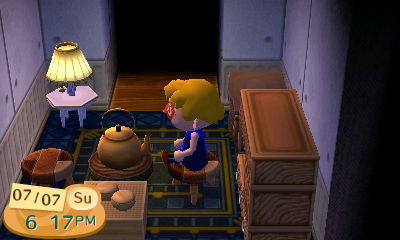
This room rejects that view of what an Animal Crossing room "should"
be. You can do things in it, not in the sense of "it has lots of
interactable objects," but in the sense that you can invite someone in
for tea, or a game of go; you can turn on the lamp and pull out the
chair and write a letter at night. The game's surface promise of a
"virtual life" can occur in this room. It's imbued with the purpose of
human living, not theater or bragging. Its composition is dense,
suboptimal, and ad hoc.
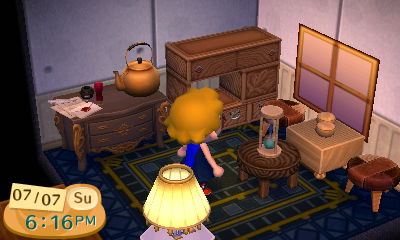
Plainly though, that's a lie. It's just as considered and unnatural as
any of the other rooms. The "human living" that happens is still only
theater when your "human" has no material or psychological needs. The
honest natural state of an Animal Crossing room is a pile of fish
and bugs and twelve kinds of chairs you're worried you won't be able
to reorder later.
But no one - not the HHA, not other villagers, not us - is comfortable
with that, either.
At E3 this year you (XSEED) announced a North American release of
Rune Factory 4.
Rune Factory and the Harvest Moon series in general has been
depressingly heteronormative in most of its entries. Marriage is
a common element in the games, but it's almost always between a man
and a woman. Unlike previous entries in the Rune Factory series
RF4 allows you to play as a young woman in addition to a young
man. And yet despite this step forward, in this version they've managed to
design something even more offensive than just ignorance and erasure.
After you beat the game, you can play as a character of the same
nominal gender you played before but with any character model
regardless of gender. This means if you want a gay or lesbian
relationship, first you need to play through the game as the other
gender. Then you can play as the gender you want, while everyone in
the game constantly misgenders you.
If there's a mainstream game with a better analogue for how our
culture treats transgender and genderqueer people, I've yet to play
it. Except it's being sold as a norm-reinforcing funny bonus "feature"
rather than an analysis of how awful that is.
XSEED, you've still got a chance to make this right. Throw that
out. Let both player characters romance and marry any of the
bachelor/bachelorettes. Write dialogue that works for gender-neutral
relationships. It's twenty-fucking-thirteen. I'm playing AAA games
with gay relationships. I'm playing AAA games with gender
sliders. Don't pretend you can roll that back ten years and aren't
making a political - and offensive, dehumanizing - statement in doing
so.
Last month I read this exchange on Twitter between Merritt Kopas, John Brindle, and Porpentine:
I'm under no illusion that they're talking about me - most likely they
are not aware of my existence - but writing about the sort of games
they make, both to help surface them on my parts of the Internet and
to process my experience playing them, was a major impetus for me
starting this blog. Many times in my life I've written privately about
games that have affected me and I wanted to make some of that public;
to improve my own skills and to give what little publicity I could to
important yet mostly-invisible games.
So far I've failed. I wrote a lot about Monster Hunter, exactly
the kind of game that doesn't need more writing. And I've got a dozen
"I played" posts about small games half-written but they're not coming
together.
BioShock, and all AAA games, have a glut of symbols outstripping
their actual meaning. They are thematically and semantically shallow
and that leaves their unanchored signs floundering near the surface
for any dumbass critic to come along and write a 10k word middlebrow
essay. It's the same problem that plagues their mechanical design -
the games are decorated with "content" and "systems," little of which
is worth intaking or interacting with; they glitter with
references and designators but few point to any objects or events
worth noting.
In contrast games like Kopas's A Synchronous Ritual and
Porpentine's How to Speak Atlantean are critically difficult.
There's precious little visible surface and things are buried deep,
but everything you do find is affecting and challenging. Even when the
games are lavish - a word I would use to describe about half of
Porpentine's games including Atlantean - the lavishness acts like a
"here there be dragons" treasure map - Dig at the X, way
down. There's gold, I promise, but it's going to take you a while. Oh,
and in the same place I've also buried your most erotic fear.
Again I think there's an analogy with the traditional meaning of
"difficult games" (e.g. Dark Souls). In a difficult game the player
and game negotiate détente. The game promises itself but only once the
player offers up part of themselves as well - a piece of procedural
memory, a bruised thumb. In a critically difficult game the game
reveals itself but the player-critic can't emerge uncritiqued
themselves - an acknowledgment of limited personal experience, limited
imagination, internalized bigotry, complicity in dangerous
systems. (In a, let's call it critically casual game, the
player-critic still emerges changed, but in a way that reinforces
whatever views they had going in.)
The first essay I wrote intending to publish here (which I still have
not done) is about Micha Cárdenas's A Survivor is #Reborn. I have
essentially rewritten it three times now and each time one section of
it grows: This game is (correctly) calling me out on my blindness to
sexism - how can I critique something that has already so effectively
criticized me?
So writing about these games is super-hard! At every step you're
critiquing yourself and your critique as much as the work in question.
That's not a reason to not do it, though. Rather the opposite - it's
why we must do it, because this is change we need. We are all
starving, and we need to learn to prepare food other than AAA
capitalism candy.
I played Fear Less! by Innomin and atpalicis. It's an endless runner
that takes probably 10-60 minutes to "complete" depending on your
skill. It deals with nightmares about dying.
I love the visual style. The desaturated palette with big pixels but
still relatively high resolution reminds me of Game Boy Color
games. The high detail with the simulated pixel grid makes it feel
unreal and dream-like. The look on the character's face
captures exactly a feeling which starts as fear and progresses into
defiance without ever needing to change.
There's all sorts of small ways the game puts forward descriptions of
fear. The specificity of the skulls with ribbons as passive reminders
of your previous attempts. Losing ground by tripping over tombstones,
fear of failure leading to failure. Later in the game pacifism is
available as a tool of the strong and able compared to violence as a
tool for the weak and afraid.
Many games have started including F2P-style "upgrades," usually to a
frustrating end - Ridiculous Fishing being a recent high-profile
game I thought suffered from its unnecessary slow pacing. This is the
first game I recall that uses that upgrade process to tell a story
rather than just eat time. (Again, compare Ridiculous Fishing which
has a story but upgrades exist only to trigger rather than reinforce
it.)
Unfortunately it still has some parts which only exist to eat time. To
reach the ending you need to unlock all the medals (achievements) and
some of those require failing in specific ways or passing milestones
that feel arbitrary. I think it would benefit from removing the
achievements and replacing the ending trigger with simply having all
upgrades. Flawless running could provide a coin multiplier or speed
increase rather than a binary on/off trigger.
I made an Emacs mode for editing Pelican blog posts. It can
automatically insert the default Pelican headers, update dates, and
build and update sites.
I can't get excited about Google Glass. The public privacy concerns
are too great. The platform is too closed, the software too
crappy. The company making it has too patchy a history of support and
too disgusting a commercial mandate.
I can't get excited about Oculus Rift. The issues I want to see more
game designs tackle right now are ones it makes worse. It's a device
that cuts out everyone around you, that makes 25% of people motion
sick, that seems basically purpose-built to re-sell the same
first-person action games and designs in an era where the usual
rasterization improvements have hit diminishing returns. Its backers
crow about immersion, but
videogame immersion is bullshit. On a purely technical
level I care more about color-accurate and high-DPI displays and it's
a big step backwards for both these things.
But yesterday Sean Hollister at The Verge
interviewed Jeri Ellsworth and Rick Johnson and demoed some new AR glasses
from Technical Illusions, a company being described as "spin-off,"
but sounds more like a cast-off, of Valve.
This is what I want. They don't take pictures. They don't tell me
where to go. They don't encourage me to come back to Doom, Team
Fortress, or other designs that worked perfectly well on traditional
displays. Instead they show me something new; they let me interact in
new kinds of spaces with other people; they let people who are not
plugged in spectate.
It's actually all in the name, right? They augment my
experience. They don't replace it, they don't virtualize it, and they
certainly don't "smooth," "simplify," or "filter" it.
Rachel Weil at Femicom wrote an incisive article about
female agency and female-inclusive NES ROM hacks:
I would suggest that the recent popularization of these harassment
stories has created a sort of anxiety around men's culpability in
these scenarios, and that these pieces on "daddy hackers" aim to
relieve this anxiety. They are heartwarming stories that present men
as problem solvers rather than problem creators. These men use the
technical knowledge that only they seem to possess in order to, as
PC Mag reports, "empower female gamers."
It's really cool that these hacks are happening. It's not cool how
they're being framed - as an afeminist, male-driven pursuit; a way to
defuse concerns about women in nerd culture while still ignoring
them. It immediately reminded me of when male progressives in the US
talk about issues affecting "our wives, daughters, mothers" - women
are liminally present, but they're never the ones speaking and never
the ones spoken to.
So here's a list of games hacked to have more women, without
any of that commentary, from Pauli Kohberger.
«
Page 4 / 6
»




